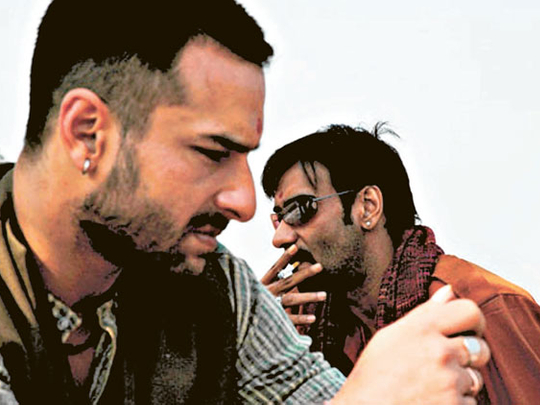
Cannes: On the silver sands at Cannes the cream of India's movie industry was celebrating in high style. The bash during the 2006 film festival was a bold declaration by the new kings of Bollywood.
Ajay Devgn and Vivek Oberoi, two of India's movie idols, took centre stage with Gurinder Chadha, director of Bend It Like Beckham. They were toasting Omkara, a Bollywood version of Othello and one of the most expensive Indian movies ever made.
Hosting the lavish event was Kishore Lulla, whose Eros International had just bought the overseas distribution rights to Omkara. As the cream of Bollywood celebrated the Shakespearean update, he was busy constructing another east-meets-west narrative. Eros was months from a float on the London Stock Exchange, which would give British investors a chance to buy into one of the largest film industries on the planet.
Six years later, Lulla is poised to move to a bigger stage by swapping Eros' London listing for New York. However, questions have been raised over deals between Eros and the London arm of another Indian film company.
A probe has discovered Eros has been used in an apparent effort by a Soho-based special effects group to embellish its financial results.
Senior company insiders say a confidential report two years ago by BDO, the accountant, found a pair of questionable transactions between Eros and Prime Focus, which is run by Namit Malhotra and best known for its special effects work on Avatar.
Prime Focus' independent auditor disputes BDO's findings.
Insiders at Prime Focus claim the deals artificially inflated the turnover of its London subsidiary, helping the loss-making operation return to profit.
Also, an attempt appears to have been made to manipulate the tax credit system that gives generous breaks to producers to bolster the British film industry.
Delicate time
The revelations come at a delicate time for Eros, which hopes to switch to the New York Stock Exchange this month.
The deals examined by BDO's fraud department involve a series of payments three years ago between Prime Focus London, Eros International and Bus Tales, a firm owned by Rasiklal Kotecha, an associate of Anshul Doshi, the British head of Prime Focus.
Bus Tales bought the rights to a children's cartoon series, Busy Buses, from Prime Focus for an undisclosed sum.
Prime Focus was then hired to turn the series into an animated film. It is understood the total value of the contract was more than £10 million (Dh58 million). At the same time, Prime Focus through its VTR Media Investment wing agreed to buy the rights to 50 of Eros' Indian movies and turn them into 3D films.
On March 31, 2010, according to BDO, although Eros denies this, Prime Focus paid about £6 million to Eros for the Hindi films. The same day, Prime Focus received a similar sum as a first instalment on its contract with Bus Tales.
Eros, according to BDO, had agreed to pay an upfront distribution fee to secure distribution rights over Busy Buses. However, instead of handing the money to Bus Tales, Eros paid it directly to Prime Focus, according to BDO.
The accountant's report found the movie rights and Busy Buses transactions were inextricably tied, according to sources. Eros insists they were unrelated.
As Prime Focus received and paid out sums of about £6 million on the same day, there would have been no impact on its cashflow. However, the purpose of the transactions was to inflate Prime Focus's revenues on the last day of its 2010 financial year, claim insiders familiar with BDO's report.
Stronger balance sheet
There were other benefits for Prime Focus. It entered the Eros film rights in its accounts as an asset worth more than £9 million, giving the appearance that its balance sheet was much stronger than it was.
In the year to the end of March 2009, Prime Focus made a £7.3 million pre-tax loss on turnover of £15.9 million. Following the Bus Tales and Eros payments, its revenues climbed to £21.5 million and Prime Focus booked a profit of £2.96 million.
BDO also voiced concerns over an attempt to exploit Britain's film tax rules, sources said. Doshi had tried to book about £2 million of costs to the Bus Tales project, according to BDO. This was to give the appearance that Prime Focus staff had been busy making the feature-length film.
Investors can claim a tax break of as much as 20 per cent of a movie's budget as long as at least 25 per cent of the work is done in Britain. The BDO audit, said sources, found that little or no real work had been done on the Busy Buses movie.
Had Doshi successfully shown that Busy Buses was a legitimate project, Bus Tales would have been able to claim a tax credit of more than £1 million. It is understood the claim was never made.
The rights to the Eros films were subsequently sold to Prime Focus's Indian parent for £9.1 million. The Busy Buses movie has yet to appear, and Prime Focus has so far released no 3D films from Eros' catalogue.
BDO declined to comment. Prime Focus confirmed that BDO had "carried out a review in 2010 that raised certain issues".
"The review was considered by the company's board of directors, its independent audit committee and its external auditor. The BDO review was not accepted," said Prime Focus. "The company's external auditor, Shipleys, signed off the March 2010 accounts without qualification as to the issues raised by BDO."
Eros said its sole dealing with Bus Tales was a "financing arrangement with the producer of the film [Inter Group Services], not Prime Focus". The investment would have given Eros a percentage of the film's gross receipts.
— The Times Newspapers Limited, London 2012












